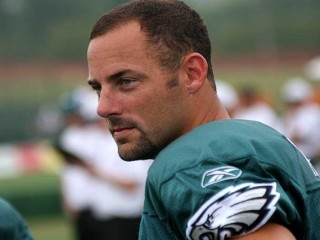
David Akers biography
Date of birth : 1974-12-09
Date of death : -
Birthplace : Lexington, Alabama
Nationality : American
Category : Sports
Last modified : 2010-12-02
Credited as : Football player NFL, placekicker for the Eagles, Pro Bowl/NFL Draft player
0 votes so far
Akers has also been a member of the Carolina Panthers, Washington Redskins and Berlin Thunder.
Atlanta Falcons and Carolina Panthers
Between 1997 and 1998, as an undrafted free agent, Akers spent time trying to make the team with the Atlanta Falcons and Carolina Panthers.
Washington Redskins
Akers was signed by the Washington Redskins in 1998 and played in one game for them, making two extra points but missing two field goal attempts of 50+ yards each. He was waived during the 1999 season.
Philadelphia Eagles
After Washington cut Akers, the Philadelphia Eagles claimed him off waivers and allocated him to NFL Europe. A solid season with the Berlin Thunder helped him earn the kicking job for the Eagles in 2000.
Akers proved to be one of the biggest special teams surprises in all of the NFL that season. He made 29 out of 33 field goals (an 87.9% success rate), and had a team-record 121 points. Akers earned the NFC Special Teams Player of the Month award in November 2000. He made the Pro Bowl for the first time in 2001 as he went 26-for-31, making a team-record seventeen consecutive field goals during the season.
Akers' best statistical season was 2002 when he connected on 30 of 34 field goals (88.2%), scored a team-record 133 points, and made another Pro Bowl. He got fewer chances in 2003, but still made 24 of 29 field goals. He made the second-longest field goal in Eagles' history on September 14, 2003, a 57-yarder against the New England Patriots at the new Lincoln Financial Field (the only longer field goal in Eagles' history was Tony Franklin's 59-yard field goal in 1979.) In 2004, Akers continued his consistent kicking with an 84.4% field goal percentage.
Injuries finally got to Akers in 2005 when he tore the hamstring in his non-kicking leg during the opening kickoff against the Oakland Raiders on September 25, 2005. Akers left the game, but returned in the second half with a heavily-taped leg to make two extra points and then kick the game-winning 28-yard field goal before collapsing in pain as his teammates mobbed him. He missed the next four games and finished the season 16 for 22, but still made his third Pro Bowl.
In 2006, Akers was injury-free, but making 18 of 23 attempts (78.3%), his second worst season statistically.
On December 16, 2007, in a 10-6 win over the Dallas Cowboys, Akers set the Philadelphia Eagles franchise record for most points and on Thanksgiving in 2008, Akers passed 1,000 career points during a 48-20 win over the Arizona Cardinals.
On December 7, 2008, Akers kicked a 51-yard field goal at Giants Stadium, his longest of the season. In the same game he had two field goals blocked, one of which was returned for a touchdown. At the end of the 2008 regular season, Akers again set the team single-season scoring record with an NFC best 144 points. He connected on 33 of 40 field goals (82.5 pct), his best percentage since 2004.
On January 11, 2009, Akers kicked three field goals in three attempts during a divisional playoff win over the New York Giants. The second of these was his seventeenth consecutive field goal without a miss during the postseason, breaking an NFL record held by one-time Eagle Gary Anderson. Akers holds an NFL record 19 consecutive postseason field goal conversions, and ranks third all time in total postseason field goal conversions with twenty-eight. The streak was snapped in the next week against the Arizona Cardinals.
Akers was selected to the 2010 Pro Bowl, his fourth. He was also named to the NFL All-Decade Team for the 2000s.
















